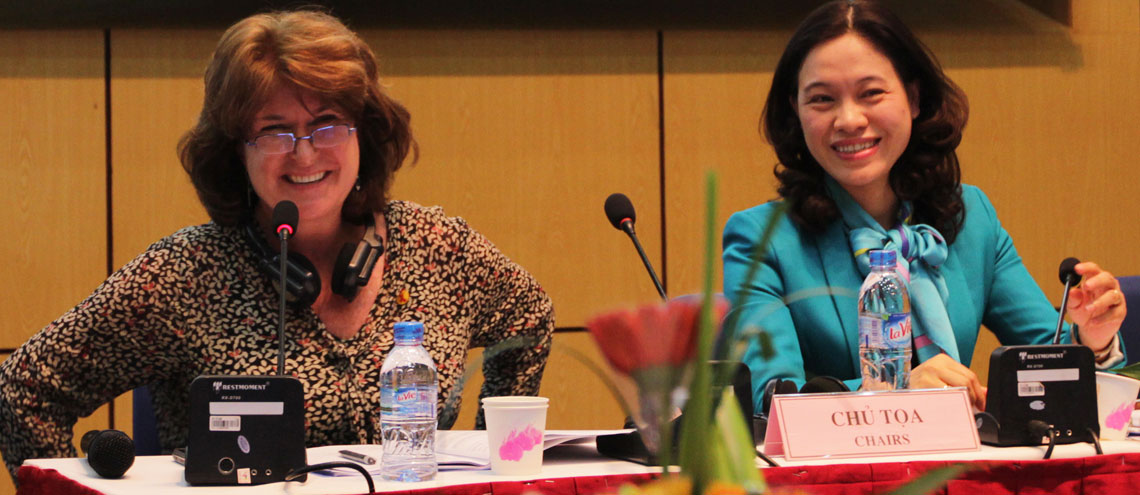Ha Noi advocacy workshop stigma and discrimination
Dr. Hoang Dinh Canh, Deputy Director General of Viet Nam Administration for AIDS Control,
Colleagues and friends,
Good morning:
I want to start by sharing with you how happy I am to see representatives of so many sectors here today, to discuss actions to better tackle stigma and discrimination against people living with HIV, and to strengthen our collective responsibility to protect their rights. I’m also of course delighted to see that we have people who are living with HIV here, who will share their experiences and their wisdom with us.
Stigma and discrimination are among the biggest barriers to universal access to health and HIV services. In Viet Nam, despite great efforts of the Government, civil society, international partners, and affected people over many years, stigma and discrimination are still wide-spread and continue to have a very negative impact on the response to HIV, and on people’s lives. In a few minutes, we will see evidence of this, in the findings of the 2014 HIV Stigma Index, a study which was conducted by people living with HIV in five provinces, including Ha Noi.
This study is significant because it shows how stigma and discrimination related to HIV in Viet Nam has changed over the years; in this case, it highlights changes between 2011 and 2014. It provides evidence to inform our continuing efforts to achieve our shared vision of “Zero Discrimination”. On this note, I want to thank the National Network of People Living with HIV (VNP+) for their work on the study, and VAAC for being supportive of this important effort.
But let’s take a moment to remind ourselves of what stigma and discrimination means!
In many cases, stigma and discrimination related to HIV means a sort of social “death”, where people living with HIV are rejected and isolated by their own families, communities, and social networks. Being HIV positive can also mean loss of jobs, loss of property, exclusion from school, being the object of violence, denial of medical and social services, and a lack of access to legal aid. Imagine yourself, or someone in your family, being denied these basic human rights!
Not only do stigma and discrimination affect individuals. They also work to spread the virus even wider among communities. People living with HIV who are afraid of what others will think, or of how they will be treated, are less likely to get tested and to adopt preventive behaviours. Because of their fears about being tested for HIV they may unknowingly pass the infection on to their loved ones. A husband may pass it on to his wife. She may pass it on to her unborn child. So in the end there are three infections, where there was only one. And this happens because people are afraid to go and get an HIV test, because of how they might be treated at the health facility.
Even if people know of their HIV infection, the presence of stigma and discrimination means that they will be less likely to disclose their HIV status to their husbands or wives, or to their families and friends.
They may also postpone or completely reject care. We hear stories of people who travel far from their own communities to find care from health service providers that they do not know, in order to prevent people in their communities from knowing about their HIV status. They are afraid of breaches of confidentiality in their own local health facility. Many seek treatment only when they can no longer hide their symptoms and are very sick. People most at risk of HIV infection, including people who inject drugs, sex workers, and men who have sex with men, face double stigma and discrimination and therefore face even greater challenges in access to health, social and legal services.
These are the facts, and you will hear more about these facts today. So many people are needlessly suffering because of stigma and discrimination! But I also want to remind you that if Viet Nam is to achieve its ambitious 90-90-90 targets, and work toward the ending of AIDS by 2030, we have to take much more focused and stronger actions against stigma and discrimination, and we must tackle this challenge starting now.
Colleagues and friends,
Viet Nam has a clear and supportive legal framework to address HIV stigma and discrimination. This includes a Law on HIV/AIDS Prevention and Control since 2006, as well as many sub-law instruments. Last December, the Ministry of Health and the Ministry of Justice issued an inter-ministerial Regulation on strengthening coordination between the two ministries, in order to provide legal support to, and protect the rights of, people living with HIV. This is very progressive, and I congratulate the Government for taking this impressive step.
The challenge now, I believe, is in the consistent and effective enforcement of this legal framework, across all sectors, and at all levels.
I urge all of you, during the course of today’s discussion, to look for practical solutions and actions that you as leaders in Ha Noi can take to address the specific issues that you will hear about today. Among other things, these solutions are so important in order to ensure that people living with HIV can access legal consultation and legal aid services when their rights have been violated.
Your discussion and recommendations for actions in today’s meeting will inform the organization of four other provincial workshops on this same topic in Hai Phong, Dien Bien, Can Tho and Ho Chi Minh City. I trust that Ha Noi, at the heart of Viet Nam’s commitment to a society of equity and justice for all, will take real leadership in fighting stigma and discrimination, and set a good example for others to follow.
I look forward to an engaging and fruitful discussion today!
Xin cam on va chuc suc khoe!




